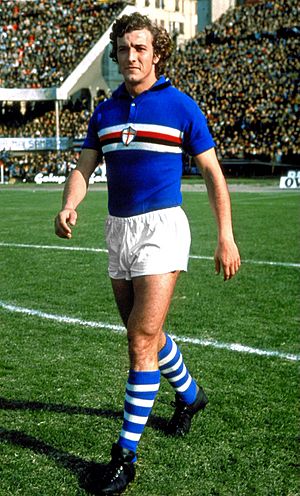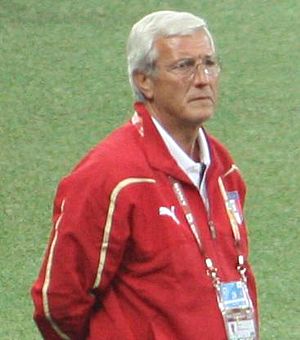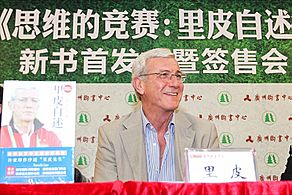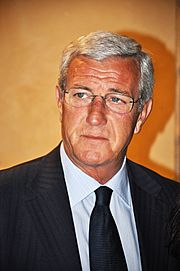Marcello Lippi facts for kids
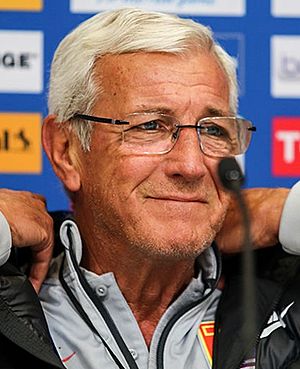
Lippi as China manager in 2019
|
||||||||||||||||
| Personal information | ||||||||||||||||
|---|---|---|---|---|---|---|---|---|---|---|---|---|---|---|---|---|
| Full name | Marcello Romeo Lippi | |||||||||||||||
| Date of birth | 12 April 1948 | |||||||||||||||
| Place of birth | Viareggio, Italy | |||||||||||||||
| Height | 1.82 m (6 ft 0 in) | |||||||||||||||
| Position(s) | Sweeper | |||||||||||||||
| Youth career | ||||||||||||||||
| 1963–1969 | Viareggio | |||||||||||||||
| Senior career* | ||||||||||||||||
| Years | Team | Apps | (Gls) | |||||||||||||
| 1969–1979 | Sampdoria | 274 | (5) | |||||||||||||
| 1969–1970 | → Savona (loan) | 21 | (2) | |||||||||||||
| 1979–1981 | Pistoiese | 45 | (0) | |||||||||||||
| 1981–1982 | Lucchese | 23 | (0) | |||||||||||||
| Total | 363 | (7) | ||||||||||||||
| International career | ||||||||||||||||
| 1971 | Italy U23 | 2 | (0) | |||||||||||||
| Managerial career | ||||||||||||||||
| 1985–1986 | Pontedera | |||||||||||||||
| 1986–1987 | Siena | |||||||||||||||
| 1987–1988 | Pistoiese | |||||||||||||||
| 1988–1989 | Carrarese | |||||||||||||||
| 1989–1991 | Cesena | |||||||||||||||
| 1991–1992 | Lucchese | |||||||||||||||
| 1992–1993 | Atalanta | |||||||||||||||
| 1993–1994 | Napoli | |||||||||||||||
| 1994–1999 | Juventus | |||||||||||||||
| 1999–2000 | Inter Milan | |||||||||||||||
| 2001–2004 | Juventus | |||||||||||||||
| 2004–2006 | Italy | |||||||||||||||
| 2008–2010 | Italy | |||||||||||||||
| 2012–2014 | Guangzhou Evergrande | |||||||||||||||
| 2016–2019 | China | |||||||||||||||
| 2019 | China | |||||||||||||||
|
Medal record
|
||||||||||||||||
| *Club domestic league appearances and goals | ||||||||||||||||
Marcello Romeo Lippi is a famous Italian former football player and manager. He was born on April 12, 1948. He is best known for leading the Italian national team to win the 2006 FIFA World Cup.
Lippi is one of the most successful football managers in history. He is the only coach to win both the UEFA Champions League (Europe's top club competition) and the AFC Champions League (Asia's top club competition). He also won the FIFA World Cup with Italy. In 2007, The Times newspaper listed him among the top 50 managers of all time.
Contents
Playing Career: Marcello Lippi as a Defender
Marcello Lippi started his professional football career in 1969. He played as a sweeper, which is a type of defender. He spent most of his playing time with Sampdoria from 1969 to 1978. He also played for Savona, Pistoiese, and Lucchese. Lippi stopped playing football in 1982 when he was 34 years old.
Coaching Career: Lippi's Rise to Success
After retiring as a player, Lippi began his coaching journey. He started as a youth-team coach at Sampdoria. He then coached several teams in Italy's lower divisions.
Early Coaching Days in Italy
Lippi became a head coach in Italy's top league, Serie A, in 1989 with Cesena. He later coached Lucchese and Atalanta. A big moment for Lippi came in the 1993–94 season. He led Napoli to qualify for the UEFA Cup, a major European competition.
Juventus: A Golden Era of Trophies
Lippi's success at Napoli caught the attention of bigger clubs. Juventus, one of Italy's biggest teams, hired him. In his first season (1994–95), he won the Serie A title and the Coppa Italia. He also reached the 1995 UEFA Cup final.
The next season, Lippi guided Juventus to win the 1995 Supercoppa Italiana and the 1995–96 UEFA Champions League title. With new star players like Zinedine Zidane and Edgar Davids, Juventus continued to win. They won two more league titles, the 1996 UEFA Super Cup, and the 1996 Intercontinental Cup. They also reached two more Champions League finals.
Inter Milan: A Brief Challenge
After five very successful years at Juventus, Lippi moved to Inter Milan in 1999. He led the club to a fourth-place finish in the league and the 2000 Coppa Italia final. However, he was sacked early in the next season after poor results.
Return to Juventus: More Victories
Lippi returned to Juventus as head coach for the 2001–02 season. Even after some key players left, the club brought in new talents like Pavel Nedvěd, Gianluigi Buffon, and Lilian Thuram. Under Lippi, Juventus won two more Serie A titles and two more Supercoppa Italiana titles. They also reached the 2003 UEFA Champions League final, but lost in a penalty shootout.
Leading the Italian National Team
In July 2004, Lippi was chosen to lead the Italian national team. The team easily qualified for the FIFA World Cup. They also had impressive wins in friendly matches, like beating the Netherlands 3–1 and Germany 4–1.
Winning the 2006 FIFA World Cup
During the 2006 FIFA World Cup, Lippi was praised for using many different players and tactics. He helped his star players, Francesco Totti and Andrea Pirlo, play well together. Italy reached the final and beat France in a penalty shootout after a 1–1 draw.
Lippi's team was known for its strong defense. Led by captain Fabio Cannavaro, Italy's defense and goalkeeper Gianluigi Buffon only let in two goals during the whole tournament. After winning the World Cup, Lippi said it was his "most satisfying moment as a coach." He left the national team shortly after.
Second Spell with Italy
Lippi was re-appointed as Italy's coach in June 2008. Italy qualified for the 2010 FIFA World Cup. However, their performance in the tournament was very disappointing. They drew with Paraguay and New Zealand, then lost to Slovakia. Italy finished last in their group and was eliminated. Lippi resigned after this defeat.
Guangzhou Evergrande: Success in China
In May 2012, Lippi became the manager of Guangzhou Evergrande, a team in the Chinese Super League. In his first season, he won both the league and the domestic cup.
In 2013, Lippi led Guangzhou Evergrande to win their third straight Chinese Super League title. He also guided them to win the 2013 AFC Champions League, which was the club's first Asian title. This was also the first time a Chinese club won a continental title in 23 years. Lippi left Guangzhou Evergrande in 2014, announcing his retirement from coaching at the time.
China National Team: A New Challenge
In October 2016, Lippi was appointed manager of the China national team. He led the team in the 2019 AFC Asian Cup, where China reached the quarter-finals. They were knocked out by Iran. Lippi then left his role as head coach.
He was re-appointed as China's coach in May 2019. However, he resigned again in November 2019 after a defeat to Syria. In October 2020, Lippi officially announced his retirement from coaching.
Coaching Style: Lippi's Philosophy
Marcello Lippi is known for his smart coaching style. He believes that team spirit and unity are very important. He often said that a group of the best players doesn't always make the best team. Instead, players must work together and follow the same plan.
Lippi was also known for being flexible with his tactics. He would change his team's formation to best suit the players he had and the opponent they were facing. For example, at Juventus, he changed formations to help players like Zinedine Zidane play their best. He also focused on players' fitness and used new training methods. Many players who played under Lippi later became successful coaches themselves, like Didier Deschamps and Zinedine Zidane.
Honours: Marcello Lippi's Achievements
Marcello Lippi won many important titles throughout his coaching career.
Managerial Trophies
- Juventus
- Serie A: 1994–95, 1996–97, 1997–98, 2001–02, 2002–03
- Coppa Italia: 1994–95
- Supercoppa Italiana: 1995, 1997, 2002, 2003
- UEFA Champions League: 1995–96
- UEFA Super Cup: 1996
- Intercontinental Cup: 1996
- Guangzhou Evergrande
- Chinese Super League: 2012, 2013, 2014
- Chinese FA Cup: 2012
- AFC Champions League: 2013
- Italy
- FIFA World Cup: 2006
Individual Awards
- IFFHS World's Best National Coach: 2006
- IFFHS World's Best Club Coach: 1996, 1998
- World Soccer World Manager of the Year: 2006
- Italian Football Hall of Fame: 2011
- Chinese Football Association Coach of the Year: 2013
- Golden Foot Award Legends: 2018
Records and Milestones
- First Coach to win both UEFA Champions League and FIFA World Cup.
- First Coach to win both UEFA Champions League and AFC Champions League.
- One of only two coaches to win both the FIFA World Cup and UEFA Champions League.
- Second most Serie A titles won by a coach: 5 (all with Juventus).
See also
 In Spanish: Marcello Lippi para niños
In Spanish: Marcello Lippi para niños
 | Mary Eliza Mahoney |
 | Susie King Taylor |
 | Ida Gray |
 | Eliza Ann Grier |


